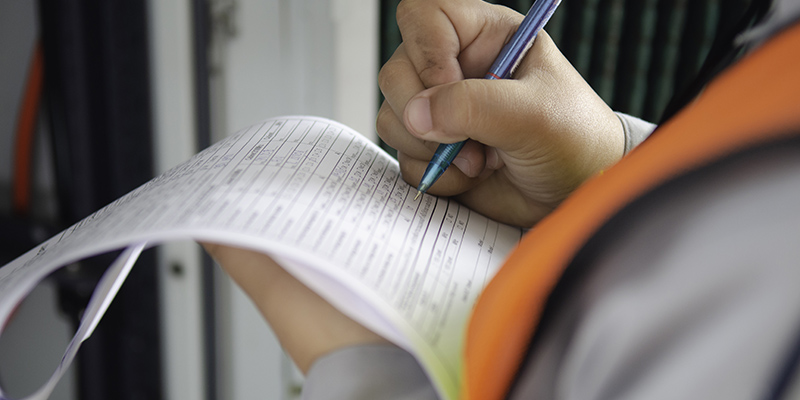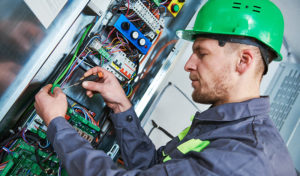Whether you are new to the commercial property ownership game or have been playing for a while, it is imperative to invest in good facilities maintenance. But, what is facilities maintenance anyway? And how exactly will it help you?
What Is Facilities Maintenance?
Facilities maintenance, or simply facility maintenance, is the process of servicing the spaces, commercial appliances, and capital assets of a building regularly with the intention of lengthening its lifespan and utility. Both facility management and building maintenance generally fall under facilities maintenance. Though, some use these terms interchangeably.
Facility maintenance is not to be confused with industrial maintenance or property maintenance. Industrial maintenance relates to manufacturing plants, whereas facilities maintenance is typically reserved for commercial establishments with no manufacturing aspects. Property maintenance, on the other hand, is administered solely to residential buildings.
Who Needs Facility Maintenance?
All kinds of commercial establishments require this type of service. But, here are the most common ones:
Offices
Though it may not seem like it, office buildings do need facilities maintenance, especially larger buildings.
Commercial appliances in offices include HVAC units and boilers, while areas that need regular servicing include elevators, hallways, parking lots, and rooms.
Hospitals
Hospitals, in particular, need facility maintenance a great deal. These establishments need to stay up-to-code and compliant with OSHA standards. That means regularly maintaining all aspects of the hospital to ensure everyone’s health and safety.
Capital assets that require servicing include imaging equipment and medical devices. Hospitals also have commercial appliances (such as HVAC units and boilers) as well as areas that need attention (such as parking lots, rooms, hallways, etc.).
Universities
Apart from office buildings and hospitals, universities are another common type of property that needs regular facilities maintenance. These institutions consist of several buildings that house capital assets such as research equipment, commercial appliances such as HVAC units, and areas such as rooms, parking lots, hallways, and more.
The Benefits of Facilities Maintenance
Like it or not, facilities maintenance is a necessary part of commercial property ownership. Sure, it might cost money, but it will save you more money in the long run. How exactly does it do this?
Facility maintenance covers both corrective and preventive maintenance. Corrective maintenance applies after the fact when a problem has already occurred. For example, when your HVAC unit stops functioning properly, corrective maintenance is needed.
But, preventive maintenance also plays a big role in facility maintenance. Rather than waiting for problems to arise, preventive maintenance focuses on servicing the building to prevent the need for repairs. This, in turn, extends the lifespan and utility of your assets and appliances. Ultimately, facilities maintenance protects your investment and saves you money by reducing the need for expensive repairs.
Facility maintenance and everything it involves also have a positive impact on the people inside your commercial property. When you maintain your assets, appliances, and areas on a regular basis, it decreases the probability of failures. And, as you may know, malfunctioning equipment can significantly impede work and make environments uncomfortable for both your workers and customers. It can even cause downtime.
Furthermore, since facility maintenance relies heavily on a schedule, you can plan out maintenance work ahead of time and stick to that timetable. This way, you will never miss scheduled maintenance tasks. Again, this all boils down to preserving the utility of your assets and making the most out of your investment.
Two Types of Facility Maintenance Workers
When it comes to facility maintenance, there are two primary types of workers — the facility manager and the maintenance technician. Let’s take a closer look at each of these workers below.
- Facilities manager job description: A facility manager is in charge of ensuring the building is safe, clean, and fully functioning. The facility manager creates maintenance and cleaning schedules, tests out safety systems, and assigns work requests to technicians. Facility managers usually do their job with the help of management software.
- Job description for maintenance technician: A facility maintenance technician, on the other hand, takes on a more hands-on approach. The maintenance technician is in charge of performing walkthroughs, conducting preventive maintenance, and administering repairs. They carry out the tasks delegated to them by the facility manager.
Facility maintenance professionals can receive proper certifications through a number of channels. The International Facility Management Association (IFMA) alone offers plenty. This includes the Certified Facility Managers (CFM) and the Facility Management Professional (FMP) credentials, both of which are officially authorized by the American National Standards Institute (ANSI).
Responsibilities of a Facility Manager
A facility manager’s duties are complex and cover a lot of ground. Not all facility managers also have the same set of tasks.
It really depends on the commercial property’s needs. In general, though, a facility manager’s responsibilities usually fall under the following categories:
1. Cleaning
Every facility needs regular cleaning to remain up to sanitation standards. A facility manager is responsible for scheduling cleaning operations. This can include sweeping and mopping the floors, cleaning and sanitizing bathrooms, disinfecting high-touch surfaces, and the like.
Cleaning and disinfecting are even more essential now thanks to the COVID-19 pandemic, and facilities must follow CDC guidelines.
2. Preventive Maintenance
A facility manager must also conduct regular inspections to identify potential failures ahead of time. The manager will then schedule preventive maintenance work. This, in turn, will prevent downtime and increase the lifespan of assets.
3. Space Allocation
A facility manager also takes on the job of allocating spaces within the building. Layouts can change over time, especially if the business grows fast or if there are any organizational changes. In that case, the facility manager must construct a new layout and assign spaces, all while keeping in mind fire safety, proper ventilation, lighting, temperature, and more.
4. Operational Tasks
Facility managers are in charge of building management, which means they must ensure the facility stays in operation daily. This usually involves overseeing day-to-day operational tasks, being readily available when needed, and troubleshooting problems as they occur.
5. Safety and Security
Safety is a top priority in facilities, no matter the kind, and the facility manager shoulders part of the burden of ensuring this. The facility manager must identify and assess all safety problems, whether they are related to the environment or health. Moreover, the facility manager must stay on top of fire safety, inspecting and testing out safety systems as well as keeping records of these inspections.
Apart from safety, facility managers also oversee security. This means maintaining security technology (both hardware and software) and even managing door guards as well as their schedules.
6. Business Continuity Planning
Facilities can experience large setbacks, and it is the job of the facility manager to construct a plan of continuity in case any of them take place. The business can’t just stop in its tracks. It must remain operational even in the face of an obstacle, and the facility manager must take charge of this task even if it means moving to a temporary secondary location.
Seek Professional Help
Facilities maintenance involves a lot of work and is not always easy to accomplish. But, considering how essential it is to any business operation, you should seriously consider investing in it.
The process of hiring and training an entire department dedicated to facility maintenance, though, can be time-consuming and expensive.
Luckily, Maintenance Specialists Inc. is here to help. We offer expert facilities maintenance consisting of a number of different services. Call us today at 704.405.6000 or contact us online to receive a free estimate.
RELATED ARTICLES:
- 7 Tips On Which Cleaning Services Your New Commercial Property Needs
- Why Building Handyman Services Are Important
- Plumbing For Commercial Buildings: What Services Do You Need?




